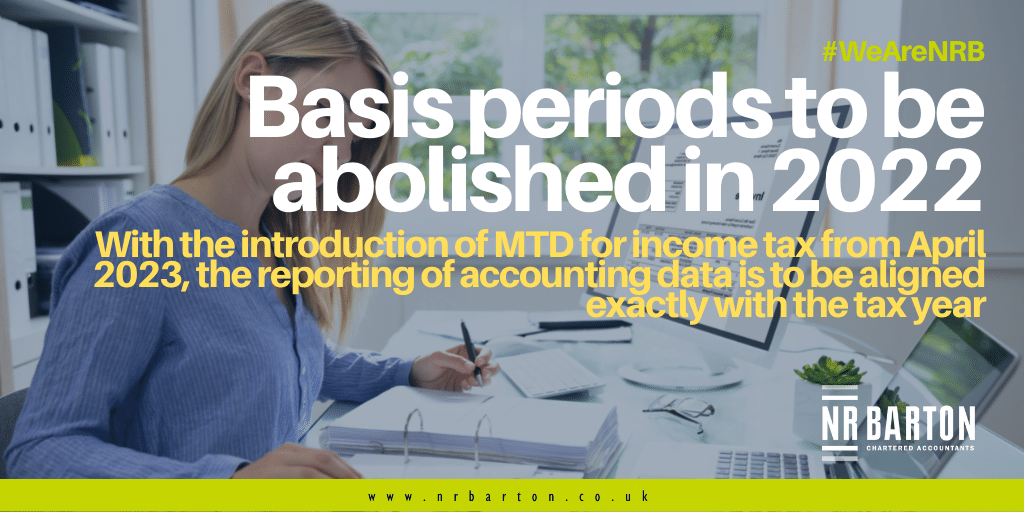“Basis Periods” are a set of tax rules that govern the timing of when income is assessed. Self-employed individuals and partnerships with trading income use basis periods to allocate trading profits and losses to specific tax years.
Basis periods are straightforward if your accounts are drawn to 5 April or 31 March every year but if a different accounting date is chosen then the rules are more complex. This can often be confusing for businesses to understand and apply which, ultimately, leads to errors and mistakes in tax returns.
Choosing an accounting date other than 5 April or 31 March means some profits are taxed twice in the early years of trading, as basis periods may overlap. These twice taxed profits are carried forwards as ‘overlap profits’ and deducted when the business ceases to trade or on a change of accounting date as ‘overlap relief’.
Draft legislation will be included in Finance Bill 2022 to move from a current (accounting) year basis to a tax year basis, where the profits or losses for a tax year are those arising in the tax year. The proposed tax year basis rules would replace all the basis period rules currently in place.
Comparison example
A business makes up its accounts to 30 June annually.
On the current year basis, its basis period for the 2023/24 tax year would be:
- Profits of the year to 30 June 2023 (i.e., the accounting period ending within the tax year).
Under the tax year basis, the business will report for the 12 months to 31 March 2024, so the apportionment would be:
- 3/12 of its profits/losses for the period of account to 30 June 2023, PLUS
- 9/12 of its profits/losses for the period of account to 30 June 2024.
Note that if the accounts to 30 June 2024 are not finalised, then the 9 months’ profits/losses will have to be estimated for submission of the 2023/24 tax return, and the tax return subsequently amended once the accounts are finalised.
What has caused the change?
With the introduction of MTD for income tax from April 2023, the reporting of accounting data is to be aligned exactly with the tax year.
The law will deem accounting periods ending on dates between 31 March to 04 April as ending on the tax year end: 05 April. Any income/expenses arising after the end of the accounting period will fall into the next tax year. This will apply to both trading and property businesses.
However, businesses which already draw up accounts to 31 March or 05 April will see no practical difference from 2022/23. Property letting businesses already must report to the tax year, but in practice many draw up their accounts to 31 March which, by concession is treated as a period ending on 05 April.
Who will the changes effect?
The proposal affects the self-employed, partnerships, trusts, and estates with trading income – the proposal will not affect companies, except for some non-resident companies.
According to HMRC, 93% of sole traders and 67% of trading partnerships already draw up accounts to the tax year or to 31 March.
Businesses with a 30 April year end will be particularly hit in the transitional year (2022/23) as they will have to report profits for the period from 01 May 2021 to 05 April 2023 in that year. There will be a transitional relief to spread the extra income falling in 2022/23 over five years to 2026/27, but that could push people into higher tax bands for those years.
Example:
Again, using a business which makes up its accounts to 30 June annually:
The business will report for up to 05 April 2023:
- 12 months profits up to 30 June 2022
- Plus, 9 months profits up to 05 April 2023
As this could lead to a significantly increased tax bill, the five year transitional relief (above) will help to mitigate the cash flow impacts.
What are the accounting implications?
According to the draft MTD ITSA (Making Tax Digital for Income Tax Self-Assessment) regulations, the quarterly updates will have to be submitted within one month after the end of that quarterly period. Regulation 11 allows the business to submit a quarterly update early, up to 10 days in advance of the end of the quarter. This means there will approximately be a 40-day window to submit the quarterly figures.
The first quarterly period for a business must start on the digital start date that applies to that business. As all unincorporated businesses will now have a digital start date as 06 April 2023, all businesses will be reporting under MTD to the same quarters. This will create a significant workload bunching for accountants in order to meet unincorporated deadlines on 05 May, 05 August, 05 November and 05 February, plus of course 31 January, which gives the extra incentive to get your records in early.
Conclusion:
In the short term, while the rules may simplify certain technical and practical matters, firms that do not make their accounts up to 31 March – 05 April will need to consider the impact of the proposed changes on their cash flow. This will be particularly apparent for the tax year 2022/23 which could see partners paying tax on significantly increased amounts of profit. These impacts will also be felt going forward, as the changes close the timing gap between profits accruing and being brought into charge.
In the long run, the reforms may remove some of the cashflow advantages of operating through a partnership model and make it harder for them to finance their working capital. It is entirely possible that some firms will want to consider the pros and cons of a move to the corporate structure in due course. If you would like to explore this topic further, you can read the draft legislation here.
Alternatively, if you have any questions relating to the content in this article, please contact your usual relationship Partner or Manager.


